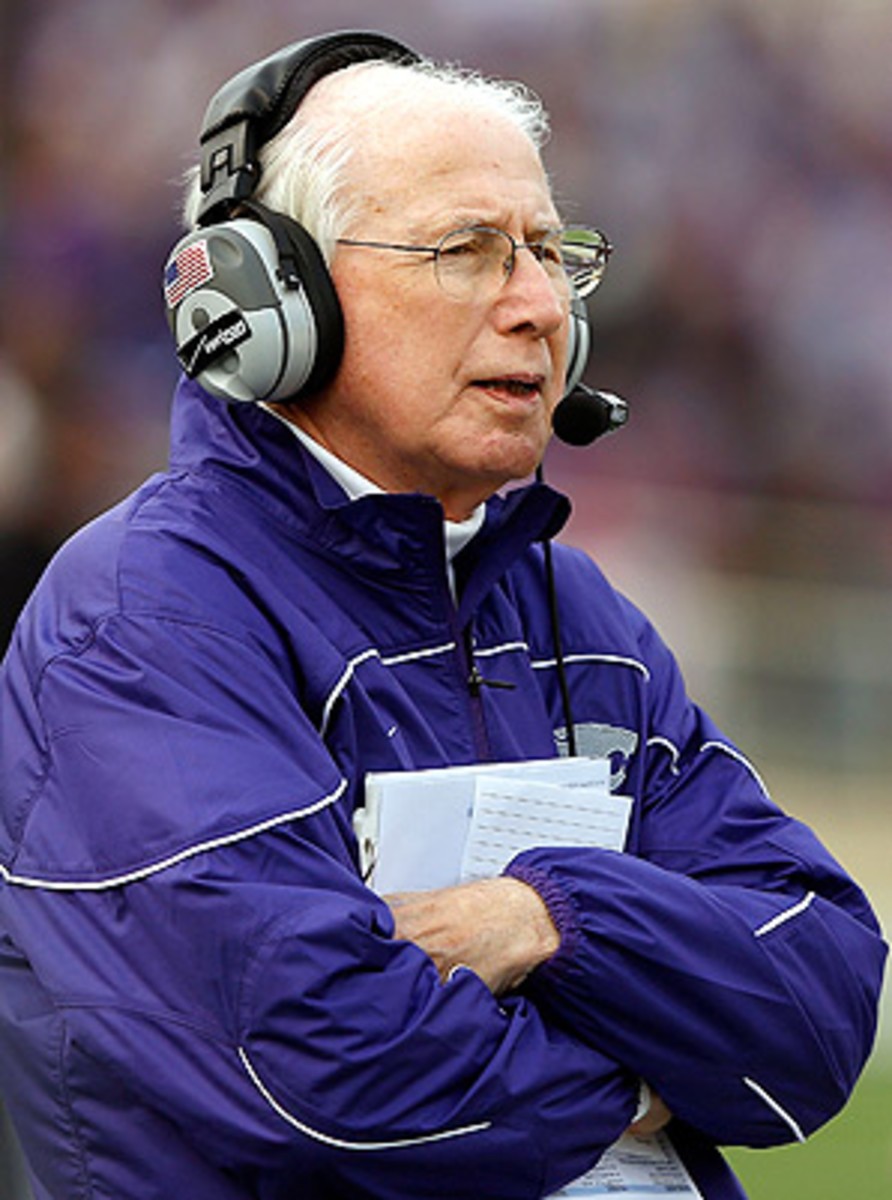My Sportsman: Bill Snyder


Bill Snyder stood in a narrow hallway outside the visitors' locker room at Oklahoma's Memorial Stadium on Sept. 22, casually sipping a cup of coffee while engulfed by microphones and television cameras. Snyder's underdog Kansas State Wildcats had just stunned the sixth-ranked Sooners 24-19, a team they lost to by 41 points the year before, and the media wanted answers to their most pressing questions.
For instance -- how did they do it?
"We kept rowing the boat," said the white-haired 73-year-old in his usual quiet voice.
OK, then. How important was this win for your program?
"All wins are important," he said. "Every coach will tell you and every player will probably tell you the same thing."
It would go on like this for about 10 minutes, the most exciting moment coming when an Oklahoma-sized locust flew and landed on the coach's purple Cotton Bowl windbreaker and he flicked it off with the ease of a Collin Klein draw play.
In a profession increasingly filled with shameless self-marketers and made-for-television sideline screamers, Snyder is ... well, boring. And that's great. The man who engineered the most remarkable turnaround of a program in major college football history, turning arguably the worst major-conference program in the country in late '80s into a national power by the mid-'90s is back for an improbable second act. In his fourth season at the helm following a three-year retirement, Snyder, formerly K-State's coach from 1989-2005, has led the Wildcats to a No. 2 spot in the BCS standings without doing much of anything differently than the first time around.
"Probably because I'm not smart enough to figure out a better way," he told me for a story last year. "It's not a way to quote-unquote turn programs around, I just have a system that's been ingrained in me for a long time as it relates to teaching and coaching. I think my approach has not been any different than it was 22 years ago."
Snyder still keeps seemingly inhuman hours, and does not seem to need nourishment to function. (He eats one meal a day, late at night, including but not limited to Taco Bell.) He still thrives with otherwise overlooked recruits like Klein, the star quarterback whose only other suitors were Colorado State, Utah and Air Force. Snyder's arriving players are still handed laminated cards listing the coach's "16 Goals For Success" (Commitment, Unselfishness, Unity, etc.). In the spirit of the "family" mantra Snyder preaches, they walk on and off the field arm-and-arm, including at halftime and the end of games. Snyder drills them on the tiniest details and it shows in their extraordinarily disciplined play. Through nine games, the Wildcats had scored 111 points off turnovers; their opponents: zero. "They come right at you. Try to make you say, 'No mas,'" said TCU coach Gary Patterson. "You've got to get ready for a 3 1/2-hour middle drill to beat them."
That Snyder is even back on a sideline would have surprised even him four years ago. After retiring following a pair of down seasons in 2004 and '05, the lifelong workaholic had carved out a more leisurely life serving his community. He served as chairman of a statewide mentoring initiative, served as an advisor to various departments at the university and spent time with his eight grandchildren.
"I didn't have that yearning," he said. "It wasn't pulling at my shirt sleeve. I had become so very accustomed to a [new] way of life and I was enjoying it."
But the program he built into a national power was struggling without him. It had gone 17-20 under successor Ron Prince, and the fan base was fracturing. So when longtime former K-State president Jon Wefald called, Snyder agreed to return if only to "calm the waters a little bit." Obviously, he far surpassed that modest goal, leading the Wildcats to their greatest heights since his 1998 team started 11-0 and reached No. 1 in the coaches poll. Snyder has said he'll return to retirement when he's confident the program is back on stable ground, so best we appreciate him while we still can.
Snyder is my Sportsman of the Year because in 2012, he showed that a coach does not need to be loud or brash to lead a dominant college football program. Nor does he need an ego. He just keeps rowing the boat, trying to get better, taking it one week at a time and doing it as a family.
